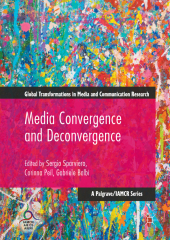 Neuerscheinungen 2017Stand: 2020-02-01 |
Schnellsuche
ISBN/Stichwort/Autor
|
Herderstraße 10
10625 Berlin
Tel.: 030 315 714 16
Fax 030 315 714 14
info@buchspektrum.de |

Gabriele Balbi, Corinna Peil, Sergio Sparviero
(Beteiligte)
Media Convergence and Deconvergence
Diversity in Media and Communications after Digitisation
Herausgegeben von Sparviero, Sergio; Peil, Corinna; Balbi, Gabriele
1st ed. 2017. 2017. xvii, 341 S. 14 SW-Abb. 210 mm
Verlag/Jahr: SPRINGER, BERLIN; SPRINGER INTERNATIONAL PUBLISHING 2017
ISBN: 3-319-51288-9 (3319512889)
Neue ISBN: 978-3-319-51288-4 (9783319512884)
Preis und Lieferzeit: Bitte klicken
This edited volume explores different meanings of media convergence and deconvergence, and reconsiders them in critical and innovative ways. Its parts provide together a broad picture of opposing trends and tensions in media convergence, by underlining the relevance of this powerful idea and emphasizing the misconceptions that it has generated. Sergio Sparviero, Corinna Peil, Gabriele Balbi and the other authors look into practices and realities of users in convergent media environments, ambiguities in the production and distribution of content, changes to the organization of media industries, the re-configuration of media markets, and the influence of policy and regulations. Primarily addressed to scholars and students in different fields of media and communication studies, Media Convergence and Deconvergence deconstructs taken-for-granted concepts and provides alternative and fresh analyses on one of the most popular topics in contemporary media culture.
Chapter 1 is available open access under a CC BY 4.0 license at link.springer.com
1. Media Convergence Meets Deconvergence; Corinna Peil and Sergio Sparviero.- 2. Deconstructing "Media Convergence": A Cultural History of the Buzzword, 1980s-2010s; Gabriele Balbi.- 3. Convergence in Domestic Media Use? The Interplay of Old and New Media at Home; Kathrin Friederike Müller and Jutta Röser.- 4. Blurred Lines, Distinct Forces. The Evolving Practices of Italian TV Audiences in a Convergent Scenario; Luca Barra and Massimo Scaglioni.- 5. Media Convergence and the Network Society: Media Logic(s), Polymedia, and the Transition of the Public Sphere; Caja Thimm.- 6. Deconstructing Audiences in Converging Media Environments;Uwe Hasebrink and Sascha Hölig.- 7. Convergent Media Quality? Comparing the Content of Online and Offline Media in Switzerland; Mark Eisenegger, Mario Schranz and Angelo Gisler.- 8.Transmedia Storytelling and Mega-Narration: Audiovisual Production in Converged Media Environments; Lothar Mikos.- 9. Web 2.0: An Argument Against Convergence;Matthew Allen.- 10. The Deconverging Convergence of the Global Communication Industries in the 21st Century;Jin Dal Yong.- 11. Deconstructing the Music Industry Ecosystem;Jim Rogers.- 12. Is Convergence the ´Killer Bug´ in the Media Ecosystem? The Case of Flemish Media Policymaking 2010-2015;Hilde Van den Bulck.- 13. Connected TV: Conceptualizing the Fit between Convergence and Organizational Strategy within a Contingency Theory Framework. The Case of Germany; Paul Murschetz.- 14. Regulatory (De)Convergence: Localism, Federalism, and Nationalism in American Telecommunications Policy;Christopher Ali.- 15. The Triple-Network Convergence in China: Implementation and Challenges;Fei Jiang, Kuo Huang and Yanran Sun.
Sergio Sparviero is an assistant professor at the Department of Communication Studies of the University of Salzburg. Corinna Peil is a postdoctoral researcher at the Department of Communication Studies, Center for ICT&S, of the University of Salzburg. Gabriele Balbi is an assistant professor in media studies at the Institute of Media and Journalism of USI Università della Svizzera italiana (Switzerland).


